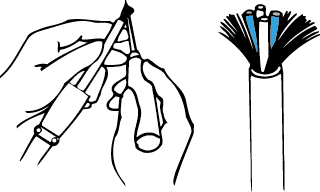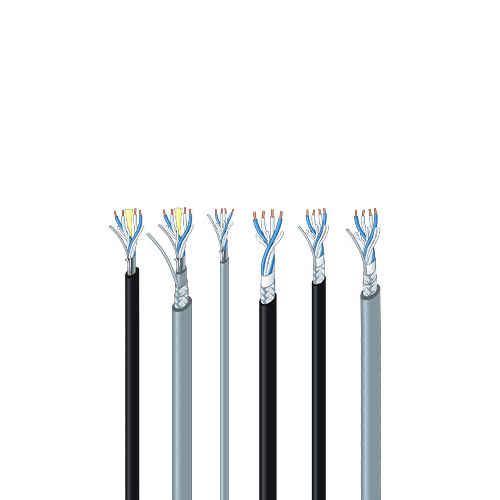Star Quad Microphone Cables (Single)
Effectively reduce noise levels to 1/10 that of general-purpose, 2-conductor shielded cables.
Key Features and Benefits
- 4-conductor style construction.
- Designed for use with microphones, and excellent for all line-level signals as well.
- Cross Linked PE Insulation.
- Reduced Handling Noise.
- Tech Data
- Downloads
Aluminum Foil Shield
| Type | Model | Sales units | Nom. O.D. | Weight | Composition | Electrical characteristics | ||||||
|---|---|---|---|---|---|---|---|---|---|---|---|---|
| No. of cond. | Cross sec. area (AWG) and cond. comp. |
Twist pitch | Shield | Cond. DCR | Shield DCR | Nom. cap.* | Nom. cap.** | |||||
| m | mm | kg/100m | mm2/(AWG) Q’ty/mm |
mm | ohm/100m | ohm/100m | pF/m | pF/m | ||||
 Jacket color GRY |
L-4E3AT | 200 500 |
3.0 | 1.2 | 4 | 0.08(28) 7/0.12A |
16 | AL foil | 24.6 | - | - | - |
 Jacket colors BLK GRY |
L-4E5AT | 100 200 400 |
5.0 | 3.3 | 4 | 0.18(25) 16/0.12A |
21 | AL foil | 10.7 | - | 164 | 222 |
| L-4E5ATG | 100 200 400 |
5.0 | 3.3 | 4 | 0.18 (25) OFC 1/0.18 + 30/0.08 |
21 | 11.1 | - | 164 | 222 | ||
| L-4E6AT | 100 200 400 |
6.2 | 5.0 | 4 | 0.31(23) 12/0.18A |
25 | 6.4 | - | 150 | 210 | ||
| L-4E6ATG | 100 200 400 |
5.8 | 4.6 | 4 | 0.34 (22) OFC 1/0.18 + 63/0.08 |
35 | 5.5 | - | 150 | 210 | ||
 Jacket color GRY |
L-4E5AT-WBS | 100 200 400 |
6.8 | 8.9 | 4 | 0.18 (25) 16/0.12A | 21 | AL foil + double braid |
10.7 | - | 164 | 222 |
| L-4E6AT-WBS | 100 200 400 |
8.6 | 12.3 | 4 | 0.31 (23) 12/0.18A |
25 | 6.4 | - | 150 | 210 | ||
- Insulation: Cross-linked PE, Jacket: PVC, Dielectric strength: 500V AC/min.
- *Capacitance between conductors **Capacitance between conductor and shield.
Key Features and Benefits / L-4ExAT Series
- Designed for fixed installations
- Aluminum foil shielding provides 100% coverage
- DuPont Kevlar* filler can resist stretching of cable when pulled through conduit. (excluding L-4E3AT)
- Foil shield and drain wire offer quick assembly work
- L-4ExATG has an OFC conductor
- L-4ExAT-WBS has a high-density double-braided shield. Its foil and braided shield are insulated by inner jacket.
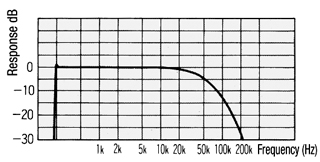
Frequency Characteristics for L-4E5AT (100m)
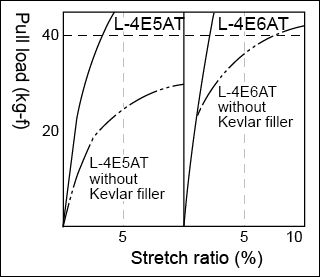
Cable Pull Load and Stretch Ratio
Braided Shield
| Type | Model | Sales units | Nom. O.D. | Weight | Composition | Electrical characteristics | ||||||
|---|---|---|---|---|---|---|---|---|---|---|---|---|
| No. of cond. | Cross sec. area (AWG) and cond. comp. |
Twist pitch | Shield Coverage (braid) |
Cond. DCR | Shield DCR | Nom. cap.* | Nom. cap.** | |||||
| m | mm | kg/100m | mm2/(AWG) Q’ty/mm | mm | % | ohm/100m | ohm/100m | pF/m | pF/m | |||
 Jacket colors for L-4E5C: BlkRed Org Yel Grn Ble GryL-4E6S: Blk Brn Red Org Yel Grn Ble Ppl Gry Wht |
L-4E5C | 100 200 |
4.8 | 3.4 | 4 | 0.15(26) 30/0.08A |
18 | 96% | 13.0 | 2.4 | 162 | 200 |
| L-4E6S | 6.0 | 4.8 | 4 | 0.20(24) 40/0.08A |
20 | 94% | 9.8 | 3.1 | 150 | 185 | ||
 Jacket colors for L-4E5C: GRYBLKL-4E5C: GRY |
L-4E5 | 100 200 |
4.8 | 3.5 | 4 | 0.15(26) 30/0.08A |
18 | 96% | 13.0 | 1.9 | 162 | 200 |
| L-4E6 | 100 200 400 |
6.5 | 6.1 | 4 | 0.23(24) 20/0.12A |
25 | 96% | 8.6 | 1.6 | 144 | 187 | |
- Insulation: Cross-linked PE, Jacket: PVC, Dielectric strength: 500V AC/min.
- *Capacitance between conductors. **Capacitance between conductor and shield.
Key Features and Benefits / L-4E5C, L-4E6S
- Bend resistant design: the conductor consists of ultrafine 0.08 mm strands offers excellent durability.
- High-density braided shield
Key Features and Benefits / L-4E5, L-4E6
- High-density braided shield
- Drain wire included
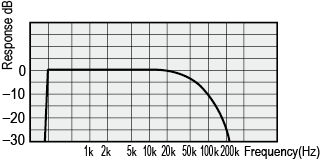
Frequency Characteristics for L-4E6S (100m)
The Star Quad Story
Canare Star Quad obtains its name from the 4-conductor style constructionthat minimizes the “loop area” between twists of the conductors. This “double balanced” pairing, reduces susceptibility to electromagnetically induced noise. The improvement in noise rejection is so noticeable, that even SCR dimmer noise (stage lighting consoles), is reduced to less than 1/10 the level found in other 2-conductor microphone cables. Canare Star Quad is designed for use with microphones but is also excellent for all line-level signals (e.g. mixer to power amps). The 4-conductor Star Quad arrangement, cancels electromagnetically induced noise from SCR dimmer packs, fluorescent lighting ballasts and AC power transformers. Handling noise is prevented by use of cotton filler material. Excellent frequency response is maintained due to special irradiated polyethylene insulation which provides a low capacitance dielectric. Canare Star Quad cable with braided shields is super flexible. We use large numbers of thin wire strands in the copper conductors and overall braided shield. We extrude a special compound PVC outer jacket that remains pliant at extremely low temperatures with no wait between cold shipping and installation.
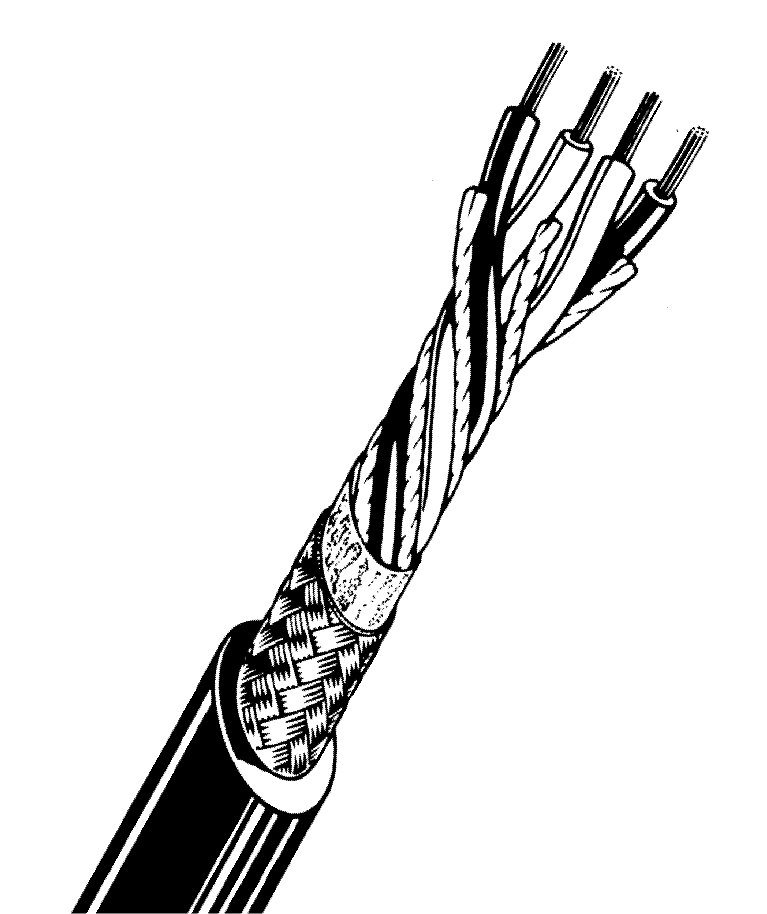
- Conductors
- All Canare microphone cables utilize high-conductivity, annealed copper wires, stranded to form flexible conductors and shields
- Filler
- Canare selects cotton, jute and /or exotic polyester fibers for packing. These fillers prevent stretching and twisting of the inner conductors which can cause noise. Additionally, paper, Mylar and/or cloth tape, bind conductors so cables hold their shape.
- Jacket
- Canare uses specially formulated PVC compounds that combine to make a tough, strong and durable outer jacket with excellent flexibility. These qualities are retained even at very low temperatures, so Canare cables will not stiffen or crack. Available in 10 attractive colors.
- Insulation
- Canare cables utilize special polymer compounds that reduce capacitive “R-C” filter roll off within the cable and prevent high voltage breakdown. By irradiating the material, the polymer becomes extensively cross-linked, chemically inert, water resistant, and remains flexible at very low temperatures. Irradiated PE is superior to ordinary polyethylene because it is heat resistant. Canare insulation will not shrink back, flow or char when soldering, so you save initial and rework time, and achieve more reliable connections.
- Shield
- Canare does not use spiral (serve) shields because they can spread apart with use. Our shields are more difficult to manufacture because we use many thin copper strands in a densely woven braid. The shields are super flexible and offer outstanding noise rejection.
In order to maximize noise rejection, Star Quad must be properly wired to the XLR-3 connector (or terminal block).
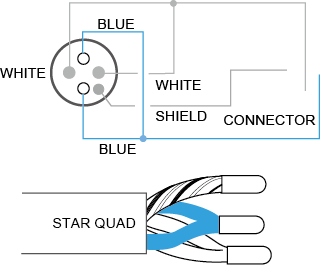
Because the shield density on Canare Cable is very high, it is somewhat difficult to push back the braid and pull the inner conductors through. Instead, we strongly recommend unbraiding the shield by “combing” it out with a pointed tool, beginning at the end of the cable.
